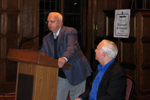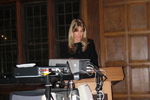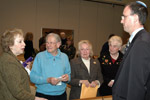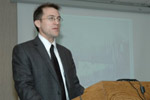- About Ramapo
- Academics
- Admissions & Aid
- Student Life
- Athletics
- Alumni
- Arts & Community
- Quick Links
- Apply
- Visit
- Give
Diverse Programming Attracts New Audiences
(PDF) (DOC) (JPG)October 23, 2007
Over the last academic year, Ramapo College’s Center for Holocaust & Genocide Studies brought a number of original and informative programs to the attention new audiences. Presenters included Holocaust survivors providing first-hand accounts of their ordeals of living through the Holocaust inferno and academics shedding new light on various aspects of that horrific and perplexing time.

Jorge Klainman
Staring the fall series was a dual-language program in which Jorge Klainman, who lives in Buenos Aires, Argentina, spoke in Spanish on October 23 to an audience of students and community members about his odyssey of survival. Kal Wagenheim, who translated Klainman’s book,The Seventh Miracle, rendered the author’s remarks into English. Among those attending the event was a sizable contingent from Ramapo College’s Spanish Studies, program which co-sponsored the event.
Jorge Klainman began the story of his struggle to remain alive with the depiction of a near-death experience as a slight fifteen-year-old. Marked for death by notorious concentration camp commandant Amon Goeth (unforgettably portrayed by Ralph Fiennes in Steven Spielberg’sSchindler’s List), he miraculously survives his own execution.
Klainman is a retired businessman who put his past behind him when he left Europe for Argentina in 1947. After celebrating his 68th birthday in 1996, he decided to break down “the wall of silence” that he had built “brick by brick.” His explanation of the title of his book comes as no surprise. “Six actual miracles occurred, and saved my life,” he says. “The seventh was my being able to write the story, after so much time.”

Ilana Offenberger
At a joint commemoration with Temple Beth Haverim of Mahwah on the anniversary of Kristallnacht, United States Holocaust Memorial Museum fellow Ilana Offenberger spoke on “Kristallnacht in Vienna: Fragments of a Shattered World.”Also known as the Night of Broken Glass, the pogrom night of November 9 – 10, 1938, with its widespread and organized nature of attacks, represented a turn in the history of Hitler’s war against the Jews. As Offenburger depicted, Nazification proceeded with such unrelenting rapidity that Jewish families soon found themselves unable to meet the financial requirements to emigrate.
Offenberger’s participation in the Kristallnachtcommemoration and classroom visit was made possible through a generous donation from Jack and Goldie Wolf Miller to the United States Holocaust Memorial Foundation’s Center for Advanced Holocaust Studies.
The perplexing question of how was anti-Semitism possible in post-World War Two Poland was the subject of the December 4th talk by Princteton historian Jan Tomasz Gross on his recentlly-published book, Fear: Anti-Semitism in Poland after Auschwitz. Sponsored by Ramapo College’s Center for Holocaust and Genocide Studies, the History Club and Hillel,. The presentation explored how the Polish Catholic Church, Communist Party workers and intellectuals responded to Jews being murdered by their fellow citizens in Kielce and elsewhere, just months after having been liberated from a five-year Nazi occupation.
Jan Gross is known for his work, Neighbors (2001), which argued that Poles, not the German occupiers, as previously believed, conducted a massacre in the Polish town of Jedwabne. The results were the subject of a vigorous debate that is likely to be repeated once Gross’s new book appears in Polish translation.
By far the most well attended program of year was a lecture by Turkish born historian Tan Akcam on “Turkish Nationalism and the Armenian Genocide that led off the Spring semester’s programming. Held on March 29th and drawing about 270 community members, it will be discussed in a separate article.

Rabbi Joel Mosbacher, Lola Kaufman, Walter Kaufman, Beth Haverim, Trude Sokolski
Our Center’s annual Yom HaShoah (Holocaust Remembrance Day) commemoration, held together with Temple Beth Haverim of Mahwah in their sanctuary on April 25, provided the next opportunity for an audience to hear a poignant account of survival. Told in a matter-of-fact tone by Ms. Lola Kaufman of New City, NY, it chronicled her odyssey in hiding following the murder of her parents in the summer of 1942, about a year after the Germans occupied her eastern Polish native city of Czortkow. Only eight at the time, she was eventually forced to join another Jewish family in a cramped hole beneath a barn the house of another woman. Considered an outsider and another mouth to feed, Ms. Kaufman related in an astonishingly self-effacing manner how just before liberation she was evicted from the hole. Advancing Soviet soldiers took her into their care and found her uncle, with whom she emigrated to the United States in 1951.
Throughout her ordeal, Ms Kaufman was only clothed in the summer dress made her mother gave her before she was killed. Five years ago, in January 2002, Ms. Kaufman donated the dress to United States Holocaust Museum. It is now in the museum’s permanent collection and symbolizes the fate of countless Jewish children who experienced a similar fate as Ms Kaufman. Most were less fortunate than she was and did not survive the Holocaust.
Lola Kaufman’s presentation was part of commemorative service in which the Choir of Beth Haverim, under Cantor David Perper, and the Ramapo Chorale and the CantaNova of Ramapo College, under assistant professor of music Lisa Lutter, performed.

Professor Steven P. Remy
Rounding off the year’s programming was a talk on April 26 by another local scholar and author, Professor Steven P. Remy of Brooklyn College and the Graduate Center of the City University of New York. He spoke about his recent book, The Heidelberg Myth: The Nazification and Denazification of a German University(Harvard University Press, 2003) in which he offers a sobering account of the German academic community from 1933 to 1957.
In words and photographs he presented a picture that depicted how, focusing on Heidelberg, the professoriate for the most part willingly embraced Nazi ideology and policy In elaborate postwar self-defense narratives, they portrayed themselves as unpolitical and uncorrupted by the nationalism, authoritarianism and racism of the Nazi years. As a consequence, denazification was resisted and compromised scholars remained in or were restored to their previous positions.
Professor Remy is currently working on a book about German-Jewish refugees in the U.S. Army in World War II. It is our intention to have him back to Ramapo to discuss this new work as soon as possible.
E-News Archives
| 2023 | 2022 | 2021 | 2019 | 2018 | 2017 | 2016 | 2015 | 2014 | 2013 | 2012 | 2011 | 2010 | 2009 | 2008 | 2007 |Copyright ©2025 Ramapo College Of New Jersey. Statements And Policies. Contact Webmaster.

Follow Us!